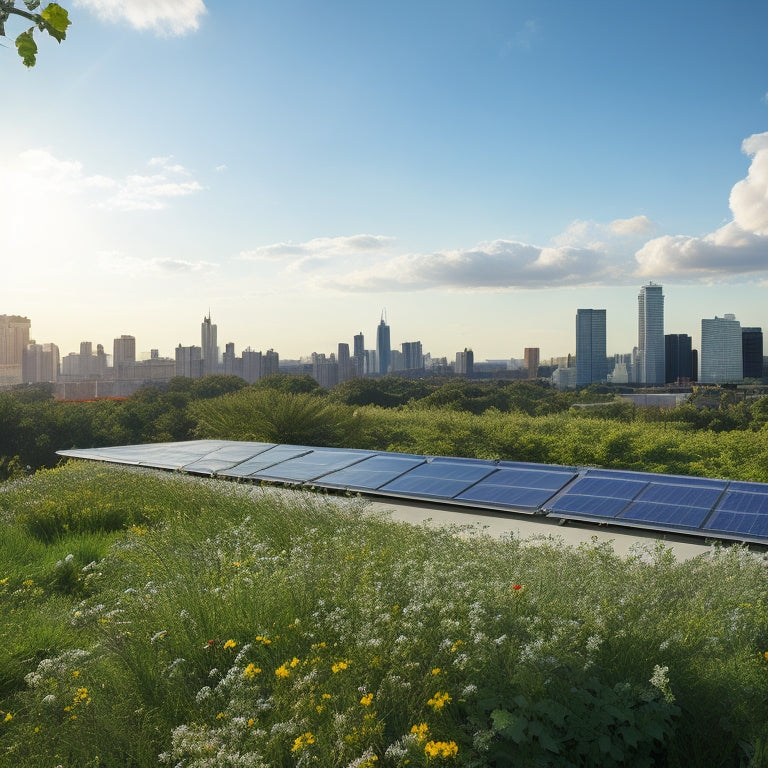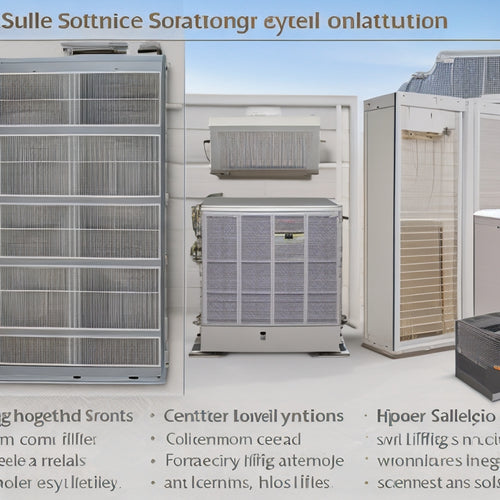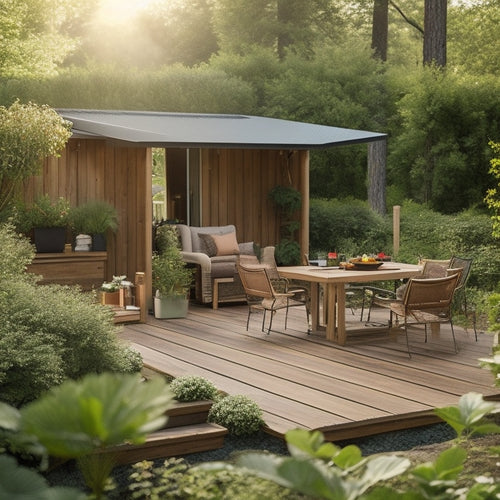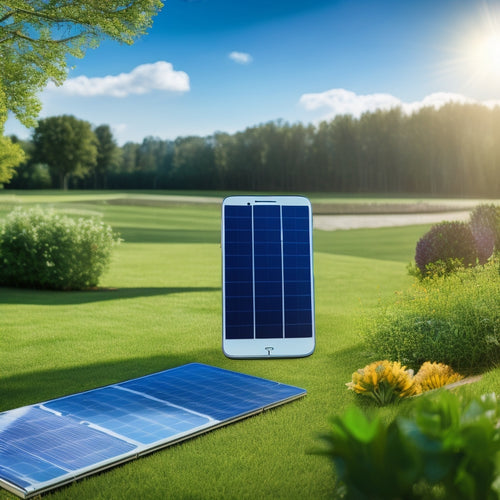
3 Green Roofing Options for Solar Panel Success
Share
When integrating solar panels with a green roof, you'll want to evaluate three key options for maximum energy output. First, vegetated roofing provides insulation and reduces stormwater runoff, making it an ideal choice. Next, solar-reflective roofing reduces heat gain and energy consumption, creating a more efficient system. Finally, recycled rubber roofing offers durability and waterproofing, ensuring your solar panels remain damage-free. By selecting the right green roofing material and designing your roof with solar integration in mind, you'll be on your way to maximizing your energy yield - and there's more to investigate to get the most out of your solar panel system.
Key Takeaways
- Vegetated roofing offers insulation, reduces stormwater runoff, and provides a habitat for wildlife, making it an ideal green roofing option for solar panels.
- Recycled rubber roofing is durable, waterproof, and UV-resistant, ensuring a long-lasting and low-maintenance base for solar panels.
- Solar-reflective roofing reduces heat gain and energy consumption, allowing solar panels to operate at maximum efficiency.
- Gable roofs with a south-facing design can maximize energy yield from solar panels, making them a popular choice for green roofing.
- Proper roof design and material selection can facilitate seamless solar installation, maximize energy yield, and simplify maintenance efforts.
Green Roofing for Solar Efficiency
How can you maximize the energy output of your solar panels while also providing insulation and reducing urban heat island effects? By incorporating green roofing into your solar panel setup, you can achieve these benefits.
To optimize energy output, focus on plant selection - choose species that require minimal maintenance and won't obstruct sunlight. Effective moisture management is also essential, as excess water can lead to panel damage and reduced efficiency.
Additionally, consider integrating sustainable station designs that feature green roofs, rainwater harvesting, and solar panels to enhance energy distribution and accessibility.
Guarantee your green roofing system includes a waterproofing membrane and a drainage layer to prevent water accumulation. By integrating these elements, you'll create a sustainable, high-performing green roof that supports your solar panels and enhances your building's overall energy efficiency.
Environmentally Friendly Roofing Materials
With the green roofing system in place, you can now turn your attention to selecting environmentally friendly roofing materials that complement your solar panels. This is an essential step in creating a sustainable and eco-friendly roofing solution.
You'll want to choose materials that not only support the weight and functionality of your solar panels but also minimize environmental impact. To maximize energy yield, high-efficiency solar panels with conversion rates up to 23% should be considered high-efficiency solar panels. Additionally, panel angle optimization can enhance energy yield by up to 10% by adjusting to seasonal changes.
-
Recycled rubber roofing: Made from recycled tires, this material is durable, waterproof, and resistant to UV rays.
-
Solar-reflective roofing: This material is designed to reflect sunlight, reducing heat gain and energy consumption.
-
Vegetated roofing: This option involves planting vegetation on your roof, providing insulation and reducing stormwater runoff.
- Low-carbon concrete roofing: This material is made with reduced carbon emissions, making it a more sustainable option.
Solar Panel Compatible Roof Designs
When integrating solar panels into your roofing system, the design of your roof itself becomes a critical factor in maximizing energy yield and ensuring a seamless installation. You'll want to evaluate roof design trends that facilitate solar integration techniques.
| Roof Design | Solar Panel Orientation | Benefits |
|---|---|---|
| Gable Roof | South-facing | Maximum energy yield due to ideal sun exposure |
| Flat Roof | Adjustable | Allows for flexibility in panel orientation and easy maintenance |
| Hip Roof | East-west | Provides a balanced energy output throughout the day |
Frequently Asked Questions
Can I Install Solar Panels on an Existing Green Roof?
You can definitely install solar panels on your existing green roof, but first, assess the roof's structural integrity and guarantee the green roof benefits, like insulation and waterproofing, won't compromise solar panel compatibility.
How Do I Ensure Waterproofing With Green Roofing and Solar Panels?
You'll guarantee waterproofing with solar panels by selecting suitable waterproofing techniques, such as membranes or coatings, and implementing effective drainage solutions, like sloped roofs or water-diverting systems, to prevent water accumulation and damage.
Are There Any Government Incentives for Green Roof Solar Installations?
As you venture into the uncharted territory of sustainable energy, you'll find a wealth of incentives awaiting you - federal tax credits and local grants will be your guiding stars, illuminating the path to a greener, freer future.
Can I Use Any Type of Plant on a Green Roof With Solar Panels?
You'll want to choose plants that thrive in harsh conditions for your green roof with solar panels, as they'll face intense sunlight and heat. Select low-maintenance, drought-tolerant species to guarantee easy green roof maintenance and ideal plant selection.
How Do I Clean the Solar Panels on a Green Roof?
You'll debunk the myth that cleaning solar panels is a hassle! Employ gentle cleaning techniques, like soft-bristled brushes and deionized water, and adopt regular maintenance tips, like scheduling bi-monthly cleanings, to guarantee peak energy utilization.
Related Posts
-

Why Solar HVAC Filters Revolutionize Home Energy Efficiency
By adopting solar HVAC filters, you're shifting your home's energy reliance from fossil fuels to clean, renewable sou...
-

Green Deck Options: Earth-Conscious Choices for Your Home
You're looking for a deck that not only enhances your home's exterior but also aligns with your eco-friendly values. ...
-

7 Best Solar Panel Upkeep Apps for Homeowners
You can optimize your solar panel's energy output and efficiency by up to 20% with regular maintenance, which is wher...


